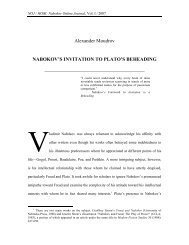domesticated translation: the case of nabokov's translation of alice's
domesticated translation: the case of nabokov's translation of alice's
domesticated translation: the case of nabokov's translation of alice's
Create successful ePaper yourself
Turn your PDF publications into a flip-book with our unique Google optimized e-Paper software.
N. Vid. “Domesticated Translation”<br />
conversations take place between a very polite upper-class girl and all sorts <strong>of</strong> older<br />
creatures, with different backgrounds, tempers and intentions. But although <strong>the</strong><br />
vocabulary and sentence structure are simple, <strong>the</strong>y never become patronizingly childish.<br />
Nabokov’s use <strong>of</strong> language results in a <strong>translation</strong> that sounds natural in Russian, but at<br />
<strong>the</strong> same time transfers an exact correspondence <strong>of</strong> <strong>the</strong> stylistic level; this correspondence<br />
is important because <strong>the</strong> Victorian society was so strictly ordered that <strong>the</strong> smallest<br />
disturbance had comical connotations. In this <strong>case</strong>, Nabokov’s faithfulness to <strong>the</strong> style <strong>of</strong><br />
<strong>the</strong> novel is remarkable. He consistently used <strong>the</strong> polite form <strong>of</strong> addressing o<strong>the</strong>rs (<strong>the</strong><br />
pronoun “vy” in Russian) in Alice’s conversations with her interlocutors. He also<br />
literally translated all expressions aimed to stress Alice’s politeness and her respectful<br />
attitude towards o<strong>the</strong>r creatures: “budte dobry”, in <strong>the</strong> conversation with <strong>the</strong> White<br />
Rabbit (“would you be so kind”); “ochen’ vezhlivo otvetila” (“she answered very<br />
politely”), in <strong>the</strong> conversation with <strong>the</strong> Caterpillar; “budte dobry mne ob’iasnit’“ (“would<br />
you be so kind and explain to me”), in <strong>the</strong> conversation with <strong>the</strong> Duchess; “akh, prostite<br />
menia” (“Oh, excuse me”), in <strong>the</strong> conversation with <strong>the</strong> Mouse. There are no examples <strong>of</strong><br />
unacceptable slang in Nabokov’s <strong>translation</strong>.<br />
Nabokov neatly reproduces uneducated, lower-class speech, as in an example<br />
with <strong>the</strong> Gryphon. There is a certain discrepancy between <strong>the</strong> Gryphon’s speech and his<br />
social status which turns him into a Mock Gryphon: “What fun! This here young lady,”<br />
said <strong>the</strong> Gryphon, “she wants for to know your history, she do.” Nabokov translated <strong>the</strong><br />
word “fun” as “umora,” a colloquial Russian word which actually means “exaggerated<br />
fun” but is derived from <strong>the</strong> verb “umorit’” which means “to kill,” and refers to <strong>the</strong><br />
Queen’s constant threats <strong>of</strong> everyone’s execution. The expression “young lady” which is
















